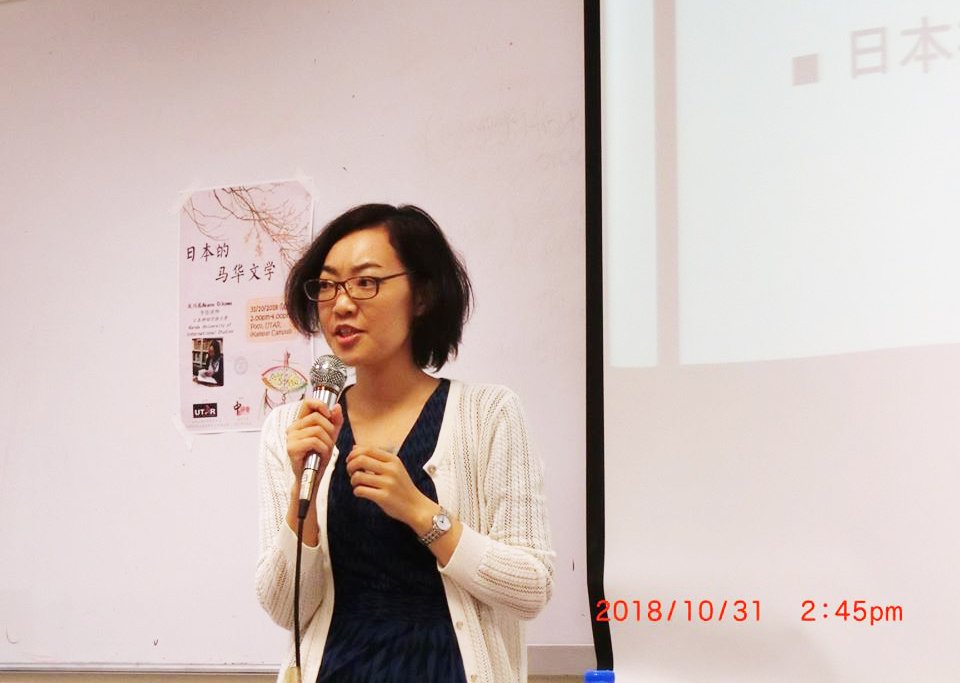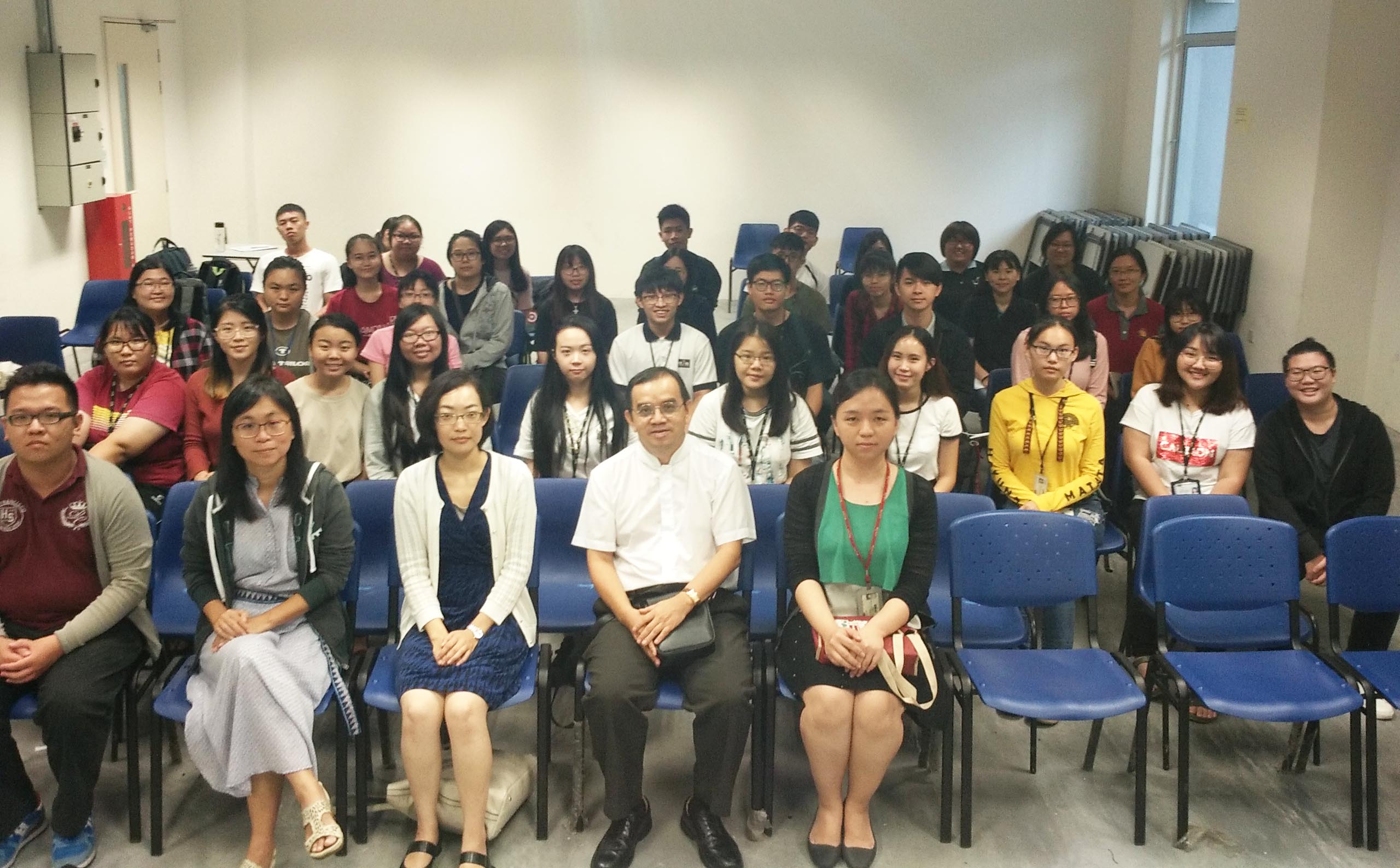

Akane explaining her resolution in the translation and research on Malaysian Chinese Literature in Japan
A talk titled “Malaysian Chinese Literature in Japan (马华文学在日本)” was organised by the Institute of Chinese Studies’ (ICS) Centre for Chinese Studies at Kampar Campus on 31 October 2018.
Invited to deliver the talk was Japan’s Kanda University of International Studies lecturer Akane Oikawa. Akane is well versed and prominent in translating Taiwanese Literature and Malaysian Chinese Literature. She has engaged in the translations of many Malaysian Chinese literary works including Li Yongping’s “The Jiling Chronicles (《吉陵春秋》)” which was co-translated with Ikegami Sadako, Ho Sok Fong’s “Lake Like A Mirror (《湖面如镜》)” and others. Besides that, she is also actively engaged in the research of Chinese Literature and Malaysian Chinese Literature.
Akane began her talk by providing the overview of Malaysian Chinese Literature’s translation from the perspective of Chinese Literature and Southeast Asian/Malaysian Literature. She then referred to the research “Malaysian Chinese Literature Research in Japan – from the Perspective of Japanese Modern Chinese Literature Studies” by Noriko Toyoda and provided the analysis of the translations and works of Malaysian Chinese Literature in Japan from the 1970s to 2000s.
She explained, “The translation works and backgrounds of the 1980s mainly focused on the Japanese memories of Malaysian Chinese, the history of Chinese immigrants, their roots and the descriptions of ordinary people. The main translators during that period were journalists and scholars who were engaged with the Chinese community and education. In the 1990s, the translation background focused on introducing new anti-Japanese sentiment-themed literature to the Japanese younger generation lest they lacked any historical understanding of the Japanese occupation previously. Such anti-Japanese literature included ‘Malaysian Anti-Japanese Literature Selection (マレーシア抗日文学選)’ which was published in 1994. After the 2000s, the theme of the translation works became more abundant, focusing on literature that has a close relationship with historical and social reality. There are also many Malaysian Chinese Literature works that have been introduced to Japan through Taiwan, such as the ‘Taiwanese Tropical Literature (台湾热带文学)’ series, a collection of Japanese translations of Malaysian Chinese Literature novels published by Kyoto Jimbun Shoin. However, the Japanese translation of Malaysian Chinese Literature is more inclined towards the translations of novels and it lacks translation on prose, poem and other genres.”
In addition, regarding the aspects of Japanese-Malaysian Chinese Literature research, she analysed the concerns of Malaysian Chinese Literature from the perspective of overseas Chinese research, Malaysian studies, Southeast Asian studies, modern Chinese literature and post-colonial studies.
Regarding the translation habits and experience, she revealed, “I will first read, and if I wish to translate it, I will try to contact the author.” Besides, in order to avoid mistranslation, especially when facing incomprehensible situations, she will seek help from experts from the relevant field and also work hard to investigate the historical background and social context of the story. If there is an opportunity, she will directly communicate with the author to seek advice.
She said, “Each corner of the world has its very own literature worth reading. In fact, some issues in Malaysia are worthy of attention, particularly issues like pluralistic culture and society, Chinese social phenomena and challenges faced by Chinese community because these issues can be used as a reference for Japanese society which is now undergoing changes.”
She also shared with the audience about her first Malaysia experience, “My first experience was listening to the Chinese radio station, 988 FM. When I was at college, I tried to learn Cantonese by listening to the broadcast from the radio. However, I found it hard to understand since it was fully broadcasted in Cantonese. The 988 FM from Malaysia did broadcasting in both Mandarin and Cantonese. It became my first choice to learn Cantonese ever since.” Later in the year 2006, she came down to Malaysia and stayed here for a month. During her stay, she read many books on Malaysian Chinese Literature published by local publishers such as Got One Publisher and Mentor Publishing. In the year 2009, she began to translate Malaysian Chinese Literature and her first translation work was Li Yongping’s “The Jiling Chronicles”.
During the Q&A session, the audience asked questions related to the challenges of translating Malaysian Chinese Literature, the interest of Japanese readers towards Malaysian Chinese Literature and many more.

Akane (front row, third from left) with the audience
© 2019 UNIVERSITI TUNKU ABDUL RAHMAN DU012(A).
Wholly owned by UTAR Education Foundation Co. No. 578227-M LEGAL STATEMENT TERM OF USAGE PRIVACY NOTICE